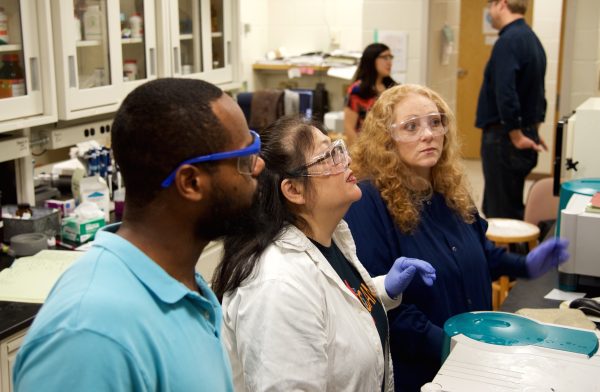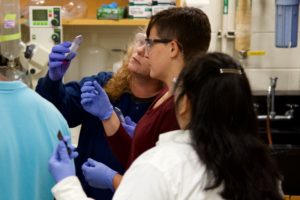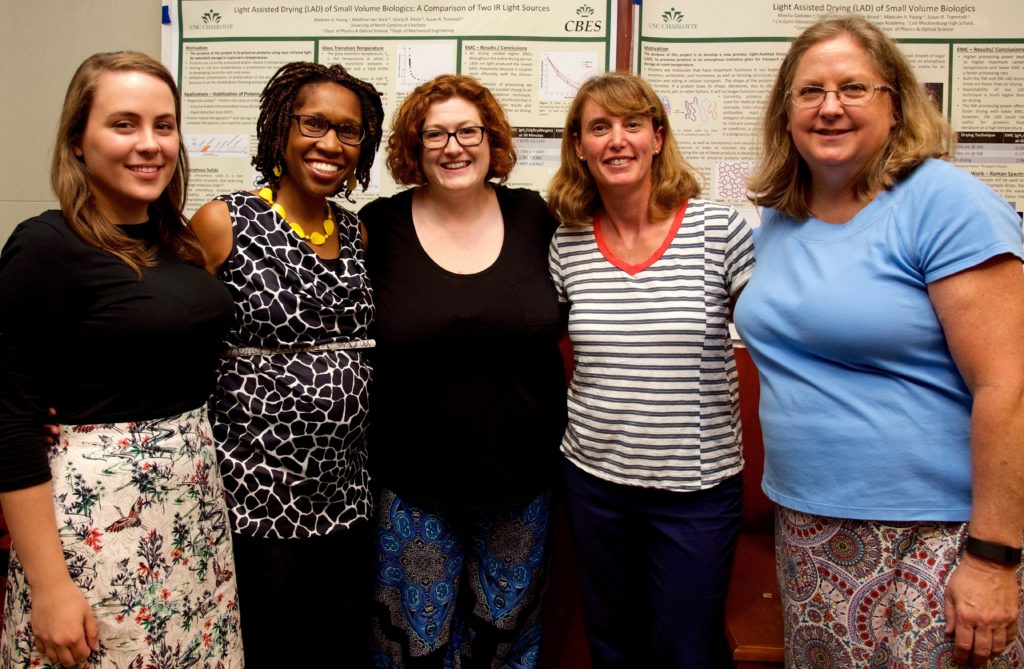Research Reality: Teachers Study With Researchers in CTI Initiative

Teachers lay the foundation for students to understand and embrace science. This significant role holds true whether the students aspire to scientific careers or simply need as citizens to understand how scientific research can help their everyday lives.
Despite their critical role, teachers often find themselves limited in their exposure to the settings where scientific research occurs.
This summer, Charlotte Teachers Institute worked with UNC Charlotte professors Susan Trammell and Marcus Jones to address that gap. Through a pilot program called the Summer Research Experience for Teachers, Charlotte-Mecklenburg Schools teachers collaborated with professors and graduate students in UNC Charlotte lab settings.
“I wanted to give teachers a first-hand look at what it is like to be a scientist,” says Trammell. “The teachers that I worked with come from many different grade levels and will prepare the scientists of the future. However, most of them have never been in a research lab and do not really know what it is like to ‘do science’ as a career. This is information that they need, to help inspire and guide their students.”
This summer’s initiative was a first for CTI, which is an educational partnership among Charlotte-Mecklenburg Schools, UNC Charlotte and Davidson College that works to improve teaching in Charlotte-Mecklenburg public schools.
“CTI is all about bringing together university and college professors to collaborate and co-create with classroom teachers,” says CTI Executive Director Scott Gartlan. “This program is no different. This experience for teachers cultivated their curiosity, creativity and knowledge of cutting-edge scientific techniques.”
The initiative came together because of converging interests, Gartlan says.
 “Marcus Jones initially reached out to CTI to support his proposal for a NSF CAREER award,” he says. “Dr. Jones and I decided to include stipends for teachers to participate in a summer research experience in his university laboratory working alongside his graduate students.”
“Marcus Jones initially reached out to CTI to support his proposal for a NSF CAREER award,” he says. “Dr. Jones and I decided to include stipends for teachers to participate in a summer research experience in his university laboratory working alongside his graduate students.”
Meanwhile, Trammell, a three-time CTI seminar leader and CTI University Advisory Council member, also wanted to broaden her research agenda to include science teacher education, a passion of hers for years.
In each lab, Trammell and Jones provided guidance for the partnership. Graduate students educated teachers on laboratory protocols and scientific principles, as well as helping them develop curricula for later use in their classrooms. The teachers expressed surprise – and gratitude – for the important role that graduate students played in the labs and in their collaboration.
“As a graduate student, my duties included overseeing safety procedures and daily lab maintenance,” says Drew Tobias, a Nanoscale Science doctoral student in Jones’ lab who worked with the teachers, along with fellow student Kathleen Dipple.
“But my role ultimately became one of a mentor,” Tobias says. “We were able to keep the teachers engaged and productive, and they were excited to be here. I think they gained insight into actual experimentation and can better relate what we are doing to general life.”
Jones’ efforts with the teachers drew from his current CTI long-term seminar, called “It’s a Small World!” which draws upon themes from his NSF-funded research. “Nanomaterials could provide a pathway to cheap and abundant renewable electricity,” Jones says. “In that context, we discussed the need for sustainable energy and the economic and environmental factors that are driving the search for alternative sources.”
Coulwood Middle science teacher Joyce Patton describes the experience and its lingering impact as amazing.
“The summer experience in Dr. Jones’ lab was inquiry learning done right,” Patton says. “Engaging, inspiring and by far the best educational experience I have ever had. It was so inspiring I was able to work with a local scientific equipment company, CEM Corp., to donate a single-mode focused microwave unit. This will allow my students to safely synthesize nanoparticles, right in the classroom.”
 UNC Charlotte’s Trammell also turned to her CTI seminar, which is titled “How Science is Done,” providing a behind the scenes look at university research and the scientific method. Doctoral candidates Joseph Peller and Madison Young joined her in coaching teachers in the lab.
UNC Charlotte’s Trammell also turned to her CTI seminar, which is titled “How Science is Done,” providing a behind the scenes look at university research and the scientific method. Doctoral candidates Joseph Peller and Madison Young joined her in coaching teachers in the lab.
Trammell’s research concentrates on biomedical applications of optical techniques, imaging and spectroscopy in particular. Projects in her lab include building a new camera that can be used for cancer detection and developing a method to preserve proteins that are used in diagnostic tests.
“It was great experience for the teachers as they learned lab work is not as formulaic as standard teaching labs would apply,” Peller says. “They encountered problem after problem, yet continued to work rigorously until they resulted in success.”
Two undergraduate student who were conducting research through the Charlotte Community Scholars program joined the team, working with CTI as interns. Political science and economics student Anthony Ellis and psychology student Kenia Rios were part of a 9-week research experience that provides students with an immersive engaged scholarship experience to address community needs.
“Over the summer I worked directly with CTI to analyze six years’ worth of data to see if the program has caused any impact,” Ellis says. “I’ve gained tons of experience working with abstract quantitative data, and now have an idea on how we can use it to improve future programs.”
Since its inception in 2009, CTI has conducted 60 long-term seminars led by 46 Davidson College and UNC Charlotte professors for more than 400 CMS teachers, totaling over 17,000 hours of professional development. The summer experience provided another avenue for exposing teachers to intense professional development.
“The teachers developed a deeper understanding of university-level scientific research, methodology, and laboratory equipment and practices,” Gartlan says. “In turn, they will develop curricula that motivates and excites their students to see the essence of scientific inquiry more as a process of discovery than as a set of rules to follow.”
Words: Tyler Harris and Kendra Sharpe | Images: Lynn Roberson
Top Image: Doctoral student Andrew Tobias (left) with teachers Joanne Rowe and Joyce Patton; Second image: Teacher Joyce Patton with doctoral student Kathleen Dipple. Third image: Professor Susan Trammell (second from right), doctoral student Madison Young (left) and teachers Miesha Gadsden, Tabitha Miller, Connie Wood.